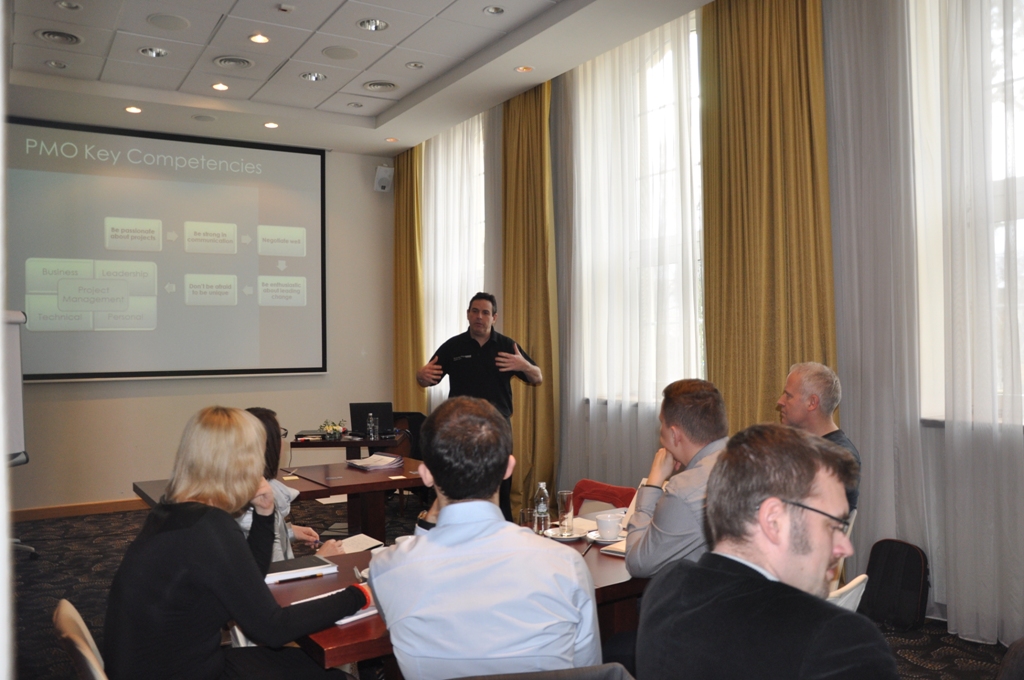
Leading Successful PMOs
How to build the best PMO for your business and keep it relevant? This and more other questions were asked during one day interactive session led by Peter Taylor and organised by Project Management Institute (PMI)® Gdansk Branch on the 1st February 2013 in Grand Hotel in Sopot.
So let’s go back in time to compare with the trends we are seeing in 2024. Surprised how little has changed? Except, of course, for AI and automation are revolutionising PMO operations.
In the rapidly evolving field of project management, the Project Management Office (PMO) is increasingly recognized as a crucial strategic asset. This article summarise Peter Taylor’s workshop and explores ten key trends that are shaping the future of PMOs, highlighting their transition from regulatory bodies to integral components of business strategy.

What’s PMO?
The Project Management Office (PMO) in a business or professional enterprise is the department or group that defines and maintains the standards of process, generally related to project management, within the organization. The PMO strives to introduce economies of repetition in the execution of projects and aims to reduce project risk through common practices and quality assurance. Furthermore, the PMO links business strategy to project-based execution of that strategy, ensuring alignment and coherence across the organization’s initiatives.
Competencies of a PMO Leader
A successful PMO leader embodies several key competencies:
- Passion for Projects. A genuine enthusiasm for project management and a drive to see projects succeed.
- Strong Communication Skills. The ability to convey ideas clearly, listen effectively, and engage stakeholders at all levels.
- Negotiation Skills. The capability to reach mutually beneficial agreements with stakeholders, team members, and other parties.
- Enthusiasm for Leading Change. A proactive attitude towards driving transformation and embracing innovation.
- Uniqueness. The confidence to stand out and implement unique strategies that align with personal strengths and organizational needs.
Among these competencies, passion and uniqueness are particularly important to me. It’s essential to remember that it’s your PMO—don’t let anyone dictate how you should operate. Embrace your individuality and lead in a way that feels authentic to you.
Tips on Best PMOs
The most effective PMOs exhibit several key characteristics:
- Consistency. The best PMOs implement consistent, repeatable project management practices across the enterprise. This consistency ensures that all projects adhere to the same standards and requirements for success. They have also streamlined processes to eliminate redundant, bureaucratic practices that can hinder project progress. These PMOs recruit top-tier project managers and continuously develop their existing PMs to maintain a high level of quality and expertise.
- Transparency. Top PMOs provide clear visibility into the progress and cost of all projects. They have a comprehensive understanding of how resources are allocated and utilized. This transparency extends to openly sharing relevant information with all appropriate stakeholders throughout the enterprise, fostering an environment of trust and accountability.
- Flexibility. Effective PMOs adapt to the strategic expectations of the enterprise and operate efficiently within the corporate structure and culture. They are flexible in their own structure and focus, allowing them to quickly adapt and adopt new methodologies and practices as needed.
Educational Initiatives
Leading PMOs sponsor training programs and facilitate communities of practice to promote project management best practices within their organizations. These communities provide a platform for PMs to share knowledge and experiences, fostering a culture of continuous learning and improvement. - Methodology. The best PMOs are custodians of a dynamic framework of methods designed to assist project managers in delivering projects successfully. This framework includes not only processes but also templates and guidance tailored to the needs of the organization and its projects.
- Assurance. Quality assurance is a critical function of top PMOs. They ensure that quality assurance processes genuinely deliver high-quality outcomes, maintaining the integrity and success of projects across the enterprise.
By adhering to these principles, PMOs can significantly enhance their effectiveness, contributing to the overall success and strategic alignment of their organizations.
Trends for PMOs in 2024 by Triskell Software
- The PMO as a strategic asset. The PMO is evolving from a regulatory and control body to a strategic business asset. PMOs must now actively collaborate with business leaders to ensure projects align with strategic objectives, participate in defining these objectives, and proactively identify strategic opportunities and threats.
- Focus on products rather than projects. Organizations are shifting their focus from projects to products, reflecting a need for more flexible and adaptive solutions.
- Leading business transformation. They should actively lead transformation initiatives, identify improvement opportunities, and promote innovation practices.
- Linking projects and products metrics to business goals. PMOs are increasingly involved in planning and managing project and product portfolios with a strategic focus.
- The power of AI and automation technologies. AI and automation are revolutionizing PMO operations. These technologies enable real-time data analysis, offering full visibility into project performance and facilitating data-driven decision-making.
- Go beyond resource allocation. PMO is responsible not only on allocating the right resources to the right initiatives at the right time, but also take some responsibility for developing and maintaining highly competent teams capable of adapting to the changing demands of the business landscape.
- Establish a PMO ecosystem to get a holistic view of all PPM processes. Effective management now encompasses projects, programs, and portfolios, requiring a holistic view. PMOs must coordinate planning and execution harmoniously, ensuring each initiative supports strategic objectives.
- Data customization Tailoring information to the organization’s diverse needs is crucial. PMOs must create customized reports and dashboards for different stakeholders, ensuring relevant data accessibility.
- Embrace Hybrid and Agile Portfolio Management. Flexibility is key to optimizing project and product management. PMOs are adopting agile methodologies to respond to the dynamic business environment, fostering collaboration and adaptability. However, not all projects benefit from agile approaches. Hybrid management methodologies, combining agile and traditional practices, provide a balanced strategy for various project types, ensuring responsive and effective management.
- Embrace PPM solutions to streamline all PMO processes. Project Portfolio Management (PPM) software is essential for operational efficiency. PPM solutions offer real-time visibility into project and product portfolios, streamline processes through automation, and standardize practices across the organization.
We invite you to join our new course from the Advanced Project Management series, where you will practically learn program and portfolio management. The first edition of the Program and Portfolio Management crash-course starts in August. We look forward to seeing you there!

Sign up for our newsletter. Each week you will receive a letter from us with articles worth reading, tools for working with teams, tips and interesting facts about project management.


